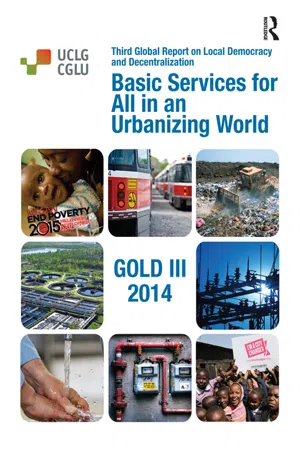![]()
Source: Halfrain
II CHAPTER ONE
Introduction
David Satterthwaite
Progress in local democracy must be measured in terms of improvements to the quality of life. Ultimately, local governments are judged on their ability to ensure that the needs of their citizens are met. Basic services are fundamental to improving living standards and, in general, local governments have the responsibility for their provision. Even when local government institutions are not officially assigned responsibility, they often deal with the health, economic, social and environmental consequences of basic unmet needs. Improving and extending the delivery of basic services has been a key component of the Millennium Development Goals (MDGs). The post-2015 Development Agenda is likely to further strengthen this focus and reaffirm the commitment of the United Nations to the eradication of extreme poverty. With this in mind, United Cities and Local Governments (UCLG) has dedicated this Third Global Report on Local Democracy and Decentralization (GOLD III) to reviewing the current state of basic local service provision across the world.
The report examines the provision and governance of local basic services in seven regions of the world. It describes gaps and deficiencies in provision and access, and seeks to draw conclusions and propose solutions about how to address them. It places a particular focus on the actual and potential role of local government in guaranteeing universal access to quality basic services.
WHAT ARE BASIC LOCAL SERVICES?
As the first GOLD Report, Decentralization and Local Democracy in the World, demonstrated, local governments usually have responsibility for a number of basic services (see Box 1.1).1 The UN Habitat Agenda provides the following definition of local basic services:
Basic infrastructure and services at the community level include the delivery of safe water, sanitation, waste management, social welfare, transport and communication facilities, energy, health and emergency services, schools, public safety and the management of open spaces.2
Box 1.1 Main local government responsibilities across the world
Services: piped water distribution, waste water and solid waste collection, public transport, street lights, cleaning of streets, markets and public places, public toilets, implementation of pollution control, public/environmental health, some aspects of child care and schooling, libraries and cultural activities, some forms of social welfare provision (usually shared with higher authorities), fire services and disaster response (usually shared with higher authorities), registration of births and deaths, monitoring for infectious diseases, cemeteries, and, in many countries, health, education, housing and policing.
Infrastructure: piped distribution of treated water, provision for sanitation and storm and surface drainage, local roads, paths and bridges, solid waste disposal facilities, waste water treatment, bus terminals, parks, squares, sports facilities, public spaces.
Buildings: implementation of building regulation, maintenance of public buildings, regulations for rented accommodation.
Urban planning: urban planning, land-use management and the application of land-use regulations, plans for the expansion of infrastructure.
Other: local economic development, tourism.
The services included within this definition can be organized into the following three categories:
• Basic infrastructure services: water and sanitation, solid waste collection and management, transport and electricity.
• Social services: education, health care, emergency services, housing, child care, and services for the elderly and other groups with special needs.
• Quality of life services: public safety, urban planning, culture and entertainment, sport and public spaces.
While the second category also includes services that are fundamental to human development, the services in the first group form the foundation on which human settlements are built and function. Everyone needs water, a toilet, energy, a way to dispose of household waste and the ability to get from place to place. Thus, this report focuses on the following local services:
• potable water supply;3
• sanitation, including the collection, treatment and disposal of waste water and runoff;
• solid waste management, including collection, disposal and recycling;4
• urban transportation;5
• energy6 (particularly electricity).
Because citizens’ needs and local government responses are diverse and evolving, flexibility has been allowed for each chapter to cover other local services, according to the particular context of each region. The Asia Pacific chapter makes reference to slum upgrading and risk prevention; the Eurasia chapter covers district heating; the North America chapter covers broadband services, as does the chapter on Europe, which also explores child and elder care services. The Latin America chapter includes a discussion of urban security and the increasing role of local governments in building safer cities. While the report is based on an analysis of these basic service sectors, its aim is to contribute to a holistic understanding of basic local service provision in each region. After all, local governments are often confronted by political, social, economic and environmental challenges that cannot be adequately tackled by isolated, single sector interventions.
There are significant differences in the extent to which the responsibilities for providing basic services are allocated between levels of government, as well as in the actual roles of local governments on the ground, whether as service funders, managers, providers or supervisors, whatever their official responsibilities. In some countries, local governments are still considered organs of the central state, meaning that they work under the direction of central governments, in some cases without any legally recognized independent authority. In most instances, however, local authorities play at least some role in these services, whether in urban infrastructure planning, land use management, revenue raising, service provision or oversight. There is, thus, a wide range of ways that well-functioning local governments can contribute to improving and extending basic services and, consequently, to improving the quality of life of their residents.
THE SCOPE OF GOLD III: BASIC LOCAL SERVICES IN CONTEXT
The seven regional chapters explore a set of common issues that shape the provision of local basic services. Each regional chapter describes the roles of each level of government and, in particular, the conditions necessary for local governments to be able to fulfil the responsibilities assigned to them. The chapters examine the relationship of local governments with national and regional levels of government, the private sector and civil society. There is a special focus on how to guarantee a minimum level of service to all, while, at the same time, ensuring the financial and environmental sustainability of services. Each chapter ends with policy recommendations on how to achieve this in the context of the existing and emerging challenges in that region.
Institutional and legal frameworks: Particular attention is given to the role of local governments and the extent of political and fiscal decentralization in the field of local basic services. Basic services are anchored in particular geographic locations and have to respond to a range of local realities. There is therefore a strong case for the decentralization of authority over many basic services, in line with the principle of subsidiarity: decisions are made by the lowest level of government that is able to make them effectively.
In decentralized systems, local governments are vested with powers to organize the provision of basic services. They are considered as the ‘organizing authority’ of such services. An organizing authority is a public or publicly-owned body with legal and political responsibility to plan or regulate services in a specified area.7 It determines the ownership model and the level of competition, and sets technical, environmental, accessibility and affordability standards.
Access: The latest data on the coverage and quality of basic local services are reviewed, as well as the disparities between countries and within them. In many cases, this task is complicated by a lack of reliable or comparable data, or controversies around how to define ‘adequate’ service standards. For example, in high-income (and many middle-income) countries, adequate provision for water is defined as drinking-quality water piped into each home 24 hours a day. However, the only global dataset on water provision8 only indicates the proportion of residents with water piped to their premises and the proportion with ‘improved provision.’ Improved provision includes public taps or standpipes, tube wells or boreholes, protected springs, protected dug wells or rainwater collection. Those with access to just a public tap or standpipe are still classified as having ‘improved provision’ even when fetching water involves long queues, sporadic availability, punishing loads to fetch and carry, and often undrinkable water. There are comparable data problems for sanitation. In high-income (and many middle-income) countries, adequate sanitation is understood as a water-sealed toilet (WC or pour-flush) in each home with provision for the safe collection and treatment of waste water and toilet waste. The only indicator available globally is for ‘improved sanitation’, which includes water-sealed toilets in a piped sewerage system, septic tank or pit latrine, ventilated improved pit latrines, pit latrines with a slab and composting toilets.9 In most urban contexts, many of these forms of ‘improved’ provision are very inadequate for health and convenience. Another data issue is the reliance of governments and international agencies on national sample surveys. These have limited utility for understanding and addressing basic service deficiencies; they can reveal the proportion of the urban or rural population with services but their sample size is too small to break down the data any further. Information on local inequalities in provision is thus very limited. Such surveys are aimed at national governments and international agencies, rather than at the local governments responsible for provision. Censuses can provide information on basic services in each small district or street, but census data are rarely available to local governments in a form that makes this possible (and usually censuses are only undertaken every ten years).
Box 1.2 The concept of decentralization*
In this report, decentralization is understood as the existence of:
• Local authorities, distinct from the state’s administrative authorities, that have
• a degree of self-government, elaborated in the framework of the law, with their own powers, resources and capacities to meet responsibilities and with legitimacy underpinned by
• representative, elected local democratic structures that determine how power is exercised and that make local authorities accountable to citizens in their jurisdiction.
* UCLG (2008) pp. 309–317.
Despite data limitations, the scale of the differences in the quality and extent of provision of basic services across the world is evident. In high- and some middle-income countries, all, or nearly all, of the population is well-served. In most middle-income countries, the proportion of the population with access to basic services increased significantly between 1990 and 2010. However, in low-and some middle-income nations, half or more of the population still lacks provision. In 2010, in sub-Saharan Africa, only 16 per cent of the population had water piped to their premises – a 1 per cent increase from 1990. In Southern Asia, the figure was 25 per cent in 2010, up from 20 per cent in 1990.10 Even with the low standards set for ‘improved provision’ of sanitation, only 30 per cent in sub-Saharan Africa and 41 per cent in South Asia had access to such services in 2010. Forty-one per cent and 25 per cent still relied on open defecation in South Asia and sub-Saharan Africa, respectively.11
Management and finance: Each of the regional chapters analyses the design and implementation of management and financing models. Management models include direct public provision, privatized provision and public-private partnerships, public-NGO and public-community partnerships. Where provision is not provided directly by the public sector, a focus is given to the capacity of local governments to provide oversight of external operators, and to ensure appropriate tendering, monitoring, enforcement and sanctioning of contracts.
In terms of financing, the regional chapters examine the extent to which local responsibilities are accompanied by fiscal decentralization (particularly local powers over taxes and service tariffs). They also review financing from the ‘3Ts’ (tariffs, taxes, transfers), a framework of funding sources for services initially developed by the OECD to ensure sustainable funding in the water sector, but applicable to any basic service. The 3Ts categorize the main sources of funds for basic services as: tariffs paid by service users, taxes (local or national) paid by citizens and distributed through governmental subsidies, and transfers from foreign donor agencies. In addition to the 3Ts, bank loans, bonds or investments by private...





